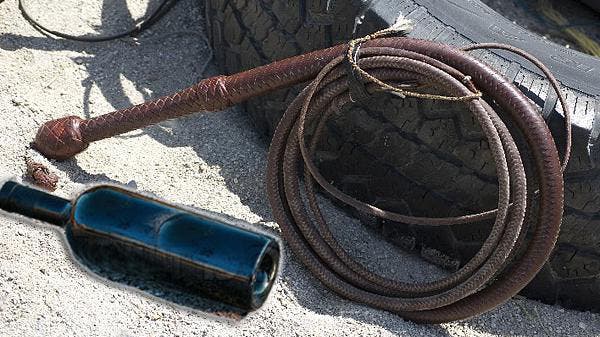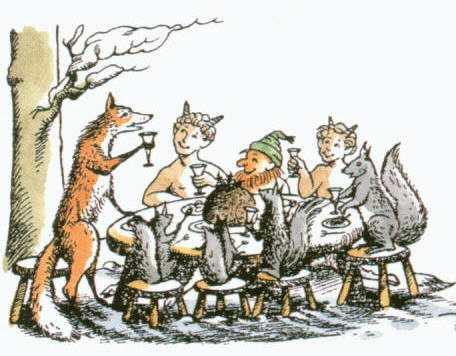Renew the Table is a series of thoughts and opinions concerning the renewal of the Lord's Supper. For more information please see Goals and Disclaimers.
I've already laid out the wonky foundations of why wine was
initially removed from worship. I then tried to show why an artificial wine
simply isn't good enough as a symbol for the real blood of Christ. As
convincing as I think these arguments are, I know that, at least for Baptists,
there is one argument that holds more weight than all of this, and it goes like
this: “For the Bible tells me so.”
I said a few posts back that it was the Baptist standards of
Biblical fidelity and an iron stance on immersion baptism that led me to the
conclusion that wine, rather than grape juice, should be served at communion.
Baptists take the bible and baptism seriously. The reason they are labeled
‘Baptist’ is because they wouldn't budge an inch on issues like believer’s
baptism and baptism by immersion. The reason they can hold so tightly to these
doctrines is because they are derived from Scripture. When someone asks why
they believe what they believe about baptism, they can pick up the text and
say, “Look here.” They've endured persecution for holding such beliefs but
because they were tied to the anchor of Scripture and refused to let it go,
they weathered the storm.
And so I'm left scratching my head wondering how
Baptists, with their noble history of fighting and dying over their Scriptural
understanding of baptism, have left the Lord’s Supper by the wayside. The
arguments offered for validating water baptism and baptism by immersion are the
very arguments they ignore when it comes to wine in the Lord’s Supper. I say
this because when asked why I believe we should use wine in the Supper I can
pick up the text (just as I can to defend water baptism) and say, “Look here”.
So the case for wine in worship swiftly becomes one a little too close for
comfort for many Bible believing Baptists. And yet they (among others) still
drink grape juice. Why is this the case?
I have pointed out that the 1925 version of the Baptist
Message and Faith includes the word ‘wine’ in spite of the practice of using
grape juice. The later versions changed ‘wine’ to ‘the fruit of the vine’. The
phrase ‘fruit of the vine’ is what we find recorded in Scripture, and so it
comes as no surprise that the Baptists would desire to use the phrase. ‘The
fruit of the vine’ or ‘the cup’ are unquestionably biblical phrases, and this
seems to rectify the practice of grape juice with the biblical command. Is not
grape juice derived from the fruit on the vine? Quite so. Problem solved. Let’s
pass another resolution on alcohol. On paper it appears that the crisis has
been averted.
But what troubles me is this: that
this change came about, not in an effort to become more biblical, but simply to
ease the Baptist mind. This change from ‘wine’ to ‘fruit of the vine’ has been
enacted not necessarily to follow the biblical command, but rather to give a
certain kind of biblical justification for using grape juice. The phrase ‘fruit
of the vine’ smells more biblical than “Dr. Welch’s Unfermented Communion
Wine”. It’s an artful dodge that any savvy politician would be impressed
with. It avoids the association with the historic cultural influence, it bypasses
the initial accusation that it usurps Christ’s command, and it stamps it all
with what appears to be the approval of the Spirit inspired Word of God.
But this is hardly how Baptists have approached issues with the other ordinance. Baptists know that the Greek word for baptism includes the idea of submerging
and dipping. We see John the Baptist baptizing in a particular place because
there was much water there. When Jesus was baptized he “came up out of the
water”. The history of the early church
indicates the same understanding and practice. Strengthened with a sound
knowledge of the language, the culture, and history, Baptists believe that the
plain reading of Scripture indicates that immersion is the correct practice.
But the same criteria is avoided or altogether rejected when it comes to
interpreting ‘the fruit of the vine’ or ‘the cup’ as wine.
The Gospels, the Epistles, the culture during Christ’s days
on earth, the history of the Church; it all points to ‘the fruit of the vine’
being wine. There is no denying the contents of ‘the cup’. To use a substance
different than what Christ commanded is one thing, but to use a substance
different than what Christ commanded and then justifying it by calling it ‘the
fruit of the vine’ is devious, if not outright demonic, for it begs the
question, “Did God really say that we should drink wine?” We are playing that wily old tactic of using the
words of Christ and giving them a different meaning.
 |
| Pumpkin Spice Communion |
Here is a question for those churches who wish to maintain
that ‘the fruit of the vine’ biblically justifies their use of grape juice:
What is stopping you or any other church from using kiwi juice? A kiwi is a
fruit that grows on the vine. Using your own biblical definition and usage of
‘the fruit of the vine’, how can you reject kiwi juice being used? In all of
God’s wisdom and humor, He deemed that pumpkins should grow on the vine. Why
not serve pumpkin juice? Why can’t we commune with a Pumpkin Spice Latte? The
moment you begin to use Scripture to tell me why I can’t drink a Pumpkin Spice
Latte at the Lord’s Table is the moment your argument for grape juice falls.
This is the third or fourth post that has touched on this
issue, so I want to be clear; this isn't about alcohol, it’s about obedience to
the Word of God and who has the final say in our worship. Baptists, for all of
their noble qualities and biblical resolve, have really dropped the ball here.
The fear of man and the traditions of men have robbed the Baptists and other
evangelicals of the fullness of their worship.
Removing wine from the Supper dealt a devastating blow to a worship
practice that was already on the ropes. The first punch of Memorialism removed
Christ’s presence and the Supper was staggering. The second punch, removing the
wine, wasn't aimed at alcohol—it was aimed at Christ’s authority. Like children
who raid the cookie jar when they think Mom isn't watching, they had the gall
(not mixed with wine, mind you) to challenge Christ’s authority because they
believed Christ wasn't there. When Christ is away the men will play.
So the Lord’s Supper is battered and bloody, lying in the ditch,
watching Baptists and Evangelicals pass by, probably on their way to an
immersion baptism or to the ballot box to vote for another Ken doll Republican.
The Good Samaritan parable is so applicable here it is (sadly) almost
effortless.
Filling the Void
 I said that Baptist and evangelical worship has been robbed.
Is it any surprise that they are looking to fill the void? If you look back
from, oh, about that time when the Lord’s Supper was kicked to the backseat (or trunk),
and you trace your finger from then to today, you will see a lot of innovations.
I remember a few years back reading an article (many articles actually)
encouraging churches and worship leaders to engage the whole worshipper and not
just their ears. They said that worshippers need to worship with all of their
senses; sound, sight, taste, touch, smell. These articles were all recognizing
that worship was lacking something, but they never put their finger on it.
Stunning visual backdrops for the stage or song slides were suggested. Things
like painting and building blocks (Oh, how I wish I was making this up) would
allow the worshipper to really express their faith. I have a book on my shelf
that recommends hiring a chef to literally cook food in the back of the
sanctuary so that people can smell the good food, and then after the service
the people can then (yes you guess it…now cringe with me) taste and see that
the Lord is good.
I said that Baptist and evangelical worship has been robbed.
Is it any surprise that they are looking to fill the void? If you look back
from, oh, about that time when the Lord’s Supper was kicked to the backseat (or trunk),
and you trace your finger from then to today, you will see a lot of innovations.
I remember a few years back reading an article (many articles actually)
encouraging churches and worship leaders to engage the whole worshipper and not
just their ears. They said that worshippers need to worship with all of their
senses; sound, sight, taste, touch, smell. These articles were all recognizing
that worship was lacking something, but they never put their finger on it.
Stunning visual backdrops for the stage or song slides were suggested. Things
like painting and building blocks (Oh, how I wish I was making this up) would
allow the worshipper to really express their faith. I have a book on my shelf
that recommends hiring a chef to literally cook food in the back of the
sanctuary so that people can smell the good food, and then after the service
the people can then (yes you guess it…now cringe with me) taste and see that
the Lord is good.
These are the kinds of things we resort to when we
ignore what Christ has commanded us to do. We feel that something is missing.
We are looking for something more. We become mystified and frustrated that
worship is not satisfying our needs, all the while the table sits in the corner
or some back room, gathering dust and old bulletins.
The removal of wine isn't the sole cause of the neglect of
the Table, but it does contribute greatly. This is because the removal of wine
is also the usurping of Christ’s authority. When we say that we are obeying
Christ by drinking grape juice and calling it ‘the fruit of the vine’ we are
really authorizing that which Christ never authorized. The reality is that the
stuff in our thimbles is not what Jesus commanded us to drink, whatever we call
it.
A Word about the 'Difference of Opinion'
One might argue that the phrase "the fruit of the vine" wasn't inserted to ease the Baptist mind, but rather to enable Baptists of differing opinions on the subject a phrase that might cover both. In other words you have two groups of baptists, fermented and unfermented, using different liquid elements in the Supper, but using the same Baptist approved phrase in order that cooperative unity might be achieved. Aside from the fact that it still seeks to ease the unfermented-baptist mind, I have two observations before we reach the bottom. 1) This re-wording doesn't unite a division, it only covers it. But like a snow covered crevasse on a mountainside, the fact that you don't see it on the surface doesn't mean it isn't there. To ignore it is as dangerous as claiming it doesn't exist. 2) If indeed the wording was changed, not to appease the grape juice crowd, but to allow a difference of opinion on this subject, then we've opened ourselves up to a fun game of "What other commands of Christ do we have the option to obey?"
The Last Dregs
I think I’ll cease pounding this wine barrel. There comes a
point when a rhythm becomes inaudible simply by being a rhythm. That is to say,
there’s only so much I can say about this before it falls on deaf ears. I can’t
promise that it won’t come up again but there are other aspects of the Table
I’m concerned about. Hopefully these last few posts have been edifying. To be
sure, a church that desires to switch from grape juice to wine will certainly
meet opposition and more than a few tough questions. Some opposition will be
wolves to kill and some will be sheep to love and teach. The ramifications will
need to be thought through with wisdom. Things like, “Should children partake
of the wine?” are, for many, going to be a tough row to hoe. My hope is that
Christ would continually be held up for all to see during the entire process
and that love for Him and His people will lead the way.










